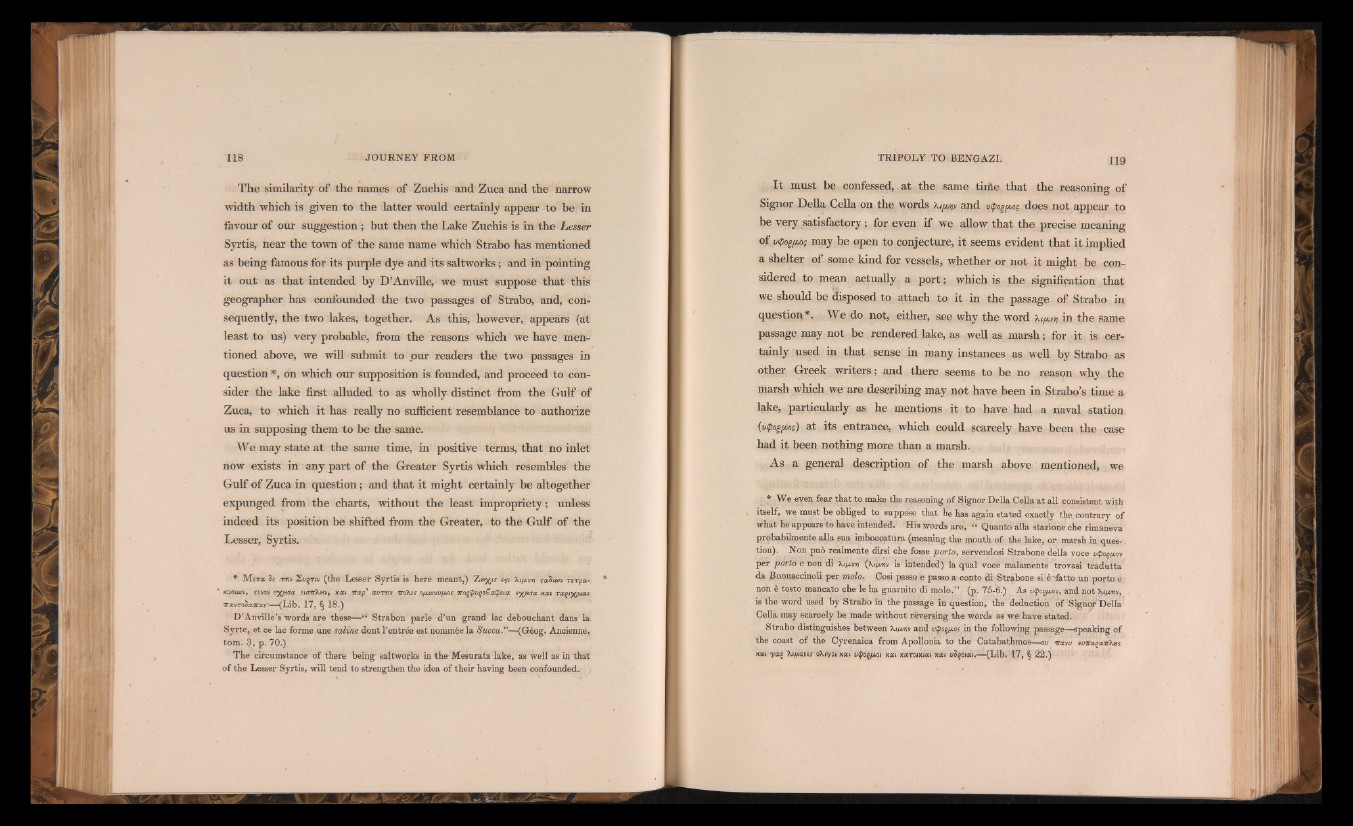
The similarity of the names of Zuchis and Zuca and the narrow
width which is given to the latter would certainly appear to be in
favour of our suggestion ; but then the Lake Zuchis is in the Lesser
Syrtis, near the town of the same name which Strabo has mentioned
as being famous for its purple dye and its saltworks ; and in pointing
it out as that intended by D’Anville, we must suppose that this
geographer has confounded the two passages of Strabo, and, consequently,
the two lakes, together. As this, however, appears (at
least to us) very probable, from the reasons which we have mentioned
above, we will submit to pur readers the two passages in
question *, on which our supposition is founded, and proceed to consider
the lake first alluded to as wholly distinct from the Gulf of
Zuca, to which it has really no sufficient resemblance to authorize
us in supposing them to be the same.
We may state at the same time, in positive terms, that no inlet
now exists in any part of the Greater Syrtis which resembles the
Gulf of Zuca in question ; and that it might certainly be altogether
expunged from the charts, without the least impropriety ; unless
indeed its position be shifted from the Greater, to the Gulf of the
Lesser, Syrtis.
* Mera 5s mv 2vgnv (the Lesser Syrtis is here meant,) 'Lhj^is s?i ?a8iuy rsrpa-
xoauoVf çïvov £%aaa, siowXsv, xou vap* avvnv noXis o/xwvu/xor Tio^vqoQaipsioc syfpaoi xai raqi^sias
TroevToüairar—(Lib. 17, § 18.)
D’Anville’s words are these—“ Strabon parle d’un grand lac débouchant dans la
Syrte, et ce lac forme une saline dont l’entrée est nommée la Succa.”—(Géog. Ancienne,
tom. 3, p. 70.)
The circumstance of there being saltworks in the Mesurata lake, as well as in that
of the Lesser Syrtis, will tend to strengthen the idea of their having been confounded.
I t must be confessed, at the same time that the reasoning of
Signor Della Celia on the words and vipo^M; does not appear to
be very satisfactory ; for even if we allow that the precise meaning
of upogiMi may be open to conjecture, it seems evident that it implied
a shelter of some kind for vessels, whether or not it might be considered
to mean actually a port ; which is the signification that
we should be disposed to attach to it in the passage of Strabo in
question*. We do not, either, see why the word Xip-jj in the same
passage may not be rendered lake, as well as marsh; for it is certainly
used in that sense in many instances as well by Strabo as
other Greek writers; and there seems to be no reason why the
marsh which we are describing may not have been in Strabo’s time a
lake, particularly as he mentions it to have had a naval station
(utpogpoi) at its entrance, which could scarcely have been the case
had it been nothing more than a marsh.
As a general description of the marsh above mentioned, we
* We even fear that to make the reasoning of. Signor Della Celia at all consistent with
itself, we must be obliged to suppose that he has again stated exactly the contrary of
what he appears to have intended. His words are, “ Quanto alla stazione che rimaneva
probabilmente alla sua imboccatura (meaning the mouth of the lake, or marsh in question).
Non può realmente dirsi che fosse porto, servendosi Strabone della voce ptpo§/xov
per porto e non di Xjacvh (Xì/xw is intended) là qual voce malamente ' trovasi ' tradùtta
da Buonaccinoli per molo. Cosi passo e passo a copto di Strabone si e satto un porto e
non è tosto mancato che le ha guarnito di molo.” (p. 75-6.) As t/pog^ov, and not
is the word used by Strabo in the passage in question, the deduction of Signor Della
Celia may scarcely be made without rèversing the words as we have stated.
Strabo-distinguishes between Xt/xnv and vipo^os in the following passage—speaking of
the coast of the Cyrenaica from Apollonia to the Catabathmos—ov rtayv sinraoarfhts
xm yctg Xt/xevsf oXiyoi xat uQoff/,ot xat xaroixiai xat pfysiai.-—(Lib. 17, § 22.)